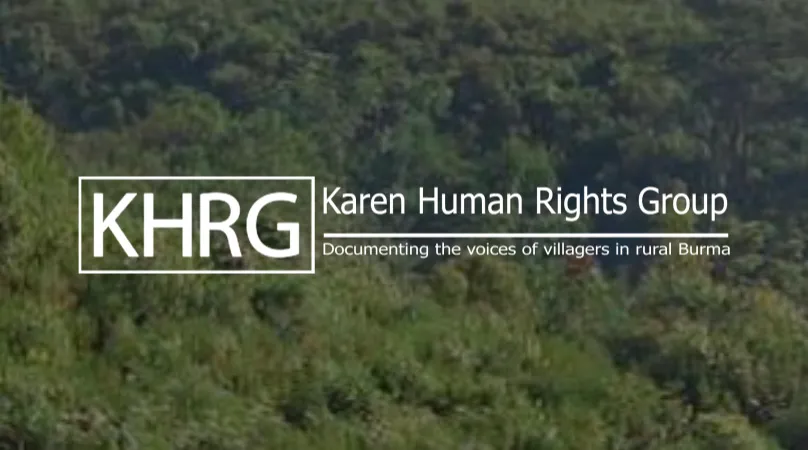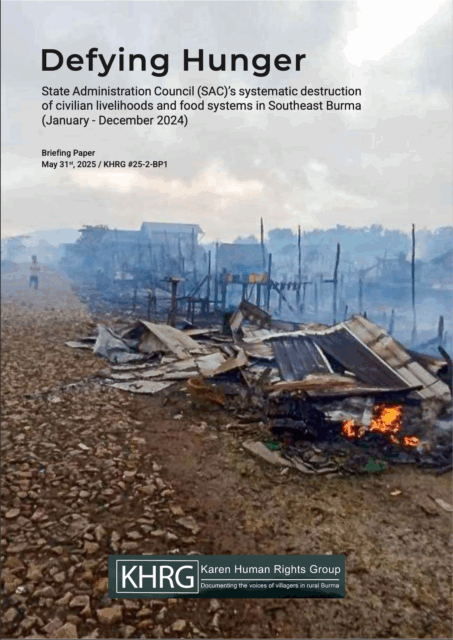Defying Hunger : State Administration Council (SAC)’s systematic destruction of civilian livelihoods and food systems in Southeast Burma (January – December 2024)
31 May 2025


1. Introduction
Since the 2021 military coup,villagers in Southeast Burma(/Myanmar) have faced constant threats to their livelihoods. Ongoing attacks by the State Administration Council (SAC)on villages and plantations have critically disrupted farming, foraging, and other traditional livelihood activities. Looting and the destruction of foodstuffs and agricultural assets have further deprived villagers of key resources necessary for survival and income generation. Additionally, SAC checkpoints have restricted access to agricultural land and local markets, thereby limiting villagers’ ability to travel and trade essential goods such as food and medicines. These abuses, combined with escalating fighting between the SAC and the Karen National Liberation Army (KNLA), along with other armed resistance groups, have aggravated the daily hardships experienced by communities. As a result, villagers continue to face forced displacement, chronic instability, and significant obstacles to achieving sustainable food security.
This briefing paper examines how the SAC’s systematic destruction of agricultural systems, indiscriminate and targeted attacks on essential assets, obstruction of basic livelihood activities, and the resulting forced displacement, have undermined villagers’ livelihoods and exacerbated food insecurity in Southeast Burma, as reported by villagers from January to December 2024 in locally-defined Karen State. First, the paper examines the historical patterns of livelihood destruction in Southeast Burma under successive military regimes. The second section illustrates the different factors contributing to this destruction in 2024, including the SAC-perpetrated attacks on agricultural production, harm to livestock, and disruptions to access to food and essential economic activities. It also highlights how the destruction of homes, forced displacement, and denial of humanitarian assistance compound the hardships endured by the civilian population. The third section analyses the legal implications of these actions under international law. Finally, the paper concludes with targeted recommendations for local and international stakeholders.
2. Contextual overview: dismantling of livelihood systems in Southeast Burma
Historical context: systematic destruction of livelihoods in Southeast Burma
Human rights in Southeast Burma have been under constant threat since the country’s independence in 1948. Under successive military regimes, civilians were subjected to extrajudicial killings, enforced disappearances, inhumane treatment, and both targeted and indiscriminate attacks on civilian areas, constituting war crimes and crimes against humanity. Beginning in the 1960s, the Burma Army launched a large-scale counter-insurgency campaign known as the four cuts strategy, aimed at severing all civilian support to ethnic armed organisations by cutting off four essential pillars: food, funds, intelligence, and recruits. Under this logic, all villagers were perceived as potential members of armed groups and were therefore indiscriminately targeted.
Depriving communities of agricultural land was central to the implementation of the first cut. In Karen State, where most of the population relies on farming, Burma Army soldiers systematically attacked food sources, including by confiscating farmland, harvests, and essential supplies –especially rice. This pattern was also driven by the failure of Burma’s military leadership to provide adequate food or pay to ground soldiers and was frequently carried out under orders from commanding officers. In addition, land was seized for military and developmental projects, while strict travel restrictions prevented villagers from accessing fields, trading, or foraging. Those who failed to comply risked being accused of supporting the resistance and faced detention, beatings, or even being shot on sight. Together, these tactics fostered food insecurity and poverty.
Building on this strategy, the Burma military also conducted clearance operations to depopulate contested areas. These operations relied on scorched-earth tactics –such as the destruction of food supplies, livestock, and homes – rendering vast areas increasingly uninhabitable. To ensure compliance, the Burma Army employed direct violence, forcing entire villages to relocate to designated sites –often fenced and under strict military control– where they were subjected to forced labour and denied access to medical care.
While the 2012 preliminary ceasefire agreements and the 2015 Nationwide Ceasefire Agreement (NCA) reduced the frequency of armed clashes, land rights remained a serious concern for local communities. The 2012 Farmland Law and the Vacant, Fallow and Virgin Lands Management Law –along with their subsequent amendments– failed to acknowledge customary land tenure systems prevalent in locally-defined Karen state. These laws allowed Burma authorities to classify ancestral lands customarily owned by local villagers as deserted and reallocate them to private companies –often without meaningful consultation or adequate compensation. Combined with inaccessible land registration procedures, many villagers became vulnerable to land confiscation and the loss of their livelihood means.
Announcements
21 May 2025
Open letter: Malaysia must lead ASEAN with principle, not hypocrisy, to address the Myanmar crisis

Progressive Voice is a participatory rights-based policy research and advocacy organization rooted in civil society, that maintains strong networks and relationships with grassroots organizations and community-based organizations throughout Myanmar. It acts as a bridge to the international community and international policymakers by amplifying voices from the ground, and advocating for a rights-based policy narrative.